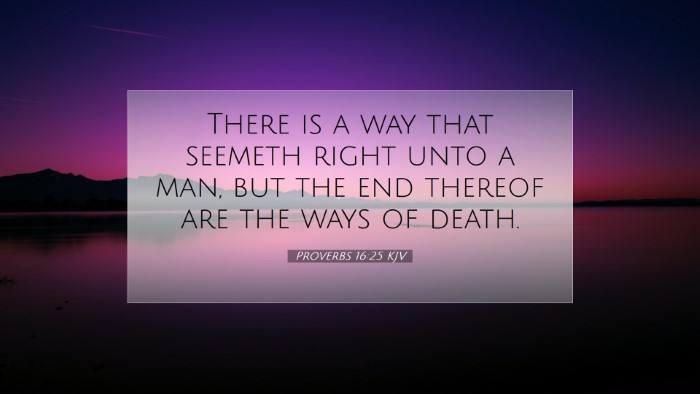Commentary on Proverbs 16:25
Verse: "There is a way that seems right to a man, but its end is the way of death." (Proverbs 16:25)
Introduction
The profound truth encapsulated in Proverbs 16:25 serves as a crucial reminder of the limitations of human wisdom in the face of divine oversight. This commentary synthesizes insights from various public domain sources to provide a comprehensive understanding suitable for pastors, theology students, and scholars alike.
The Dangers of Self-Deception
Matthew Henry's Commentary: Henry emphasizes the dangers inherent in the self-deceptive nature of man. He highlights that while an individual may feel justified in their path or reasoning, such feelings can lead to destructive consequences. This internal assurance, "seems right," is often illusory.
Henry suggests that many walk confidently towards destruction, lulled by their own reasoning. He asserts that the final destination is one of death—both spiritual and physical—reminding readers that familiarity with God’s laws is imperative to avoid these pitfalls.
Human Wisdom Versus Divine Wisdom
Albert Barnes' Notes: Barnes contemplates the distinction between human perceptions of right and the divine reality of righteousness. He proposes that the path that seems right to an individual may actually contradict God's commands. This perspective is vital; despite human beliefs and evaluations, God's truth prevails.
- Human Reasoning: Humans often rely on their understanding, neglecting divine guidance.
- Outcome of Choices: The verse starkly warns that decisions, even if founded on a subjective sense of right, can culminate in dire consequences.
The Path of Destruction
Adam Clarke's Commentary: Clarke deepens the exploration of the "way" mentioned in this verse. He elucidates that the path leading to death is often paved with good intentions and misguided choices. Misalignment with God's will ultimately leads to ruin, a critical warning for both individuals and communities.
Clarke notes that this verse applies broadly across various aspects of life, including ethical decisions, leadership, and personal conduct, emphasizing that what appears favorable to human wisdom might be fraught with peril spiritually.
Practical Implications for Believers
In light of these insights, it is essential for believers to regularly evaluate their paths against God’s Word. The implications for Christian life are numerous:
- Seek God’s Guidance: Regular prayer, meditation on Scripture, and seeking counsel from wise mentors bolster one's ability to discern the right path.
- Be Humble: Acknowledge the limitations of human understanding and maintain an attitude of humility before God.
- Engage in Community: The involvement in faith communities allows for collective wisdom and accountability, helping to mitigate individual biases.
Conclusion
Proverbs 16:25 stands as a profound warning against the self-reliance of human wisdom. Through the combined insights of Henry, Barnes, and Clarke, readers are urged to remain vigilant, continually seeking divine wisdom in their decision-making processes to avoid the destructive consequences outlined in this verse. Ultimately, the path to life is found in the pursuit of God's truth, surrendering our limited perspectives to His infinite wisdom.


